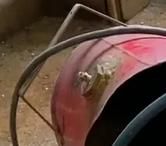Um, I'd like to see a second opinion before assuming the weld failed due to rust. Could be, but…
In the second video, this looks good:

while the first video suggests it's been mended and is in much worse condition:

Looks like the tank has been mended. Have to say patching up safety critical items isn't smart unless you really know what you're doing. And most of us don't! There's a big gap between really knowing and confidence based on limited personal experience. On a job like this years of hands-on experience is low value compared with x-ray and ultra-sound testing!
I'd like to know how often the compressor was used. Looked like a busy work shop, so maybe every day for 10 years. A problem with pressure vessels is they have to cope with more than just pressure. They also have to be strong enough to resist metal fatigue caused by repeated expansions and contractions. These caused the de Havilland Comet to break up in flight, even though the pressure changes were low. Micro-cracking is invisible, it can't be detected by simple means, and it's accelerated by corrosion, physical damage and any other stress-raiser. In this example, the weld may have failed due to fatigue, or a ding, not corrosion. Without a proper examination no one knows.
Metal fatigue means pressure vessels have a limited lifetime after which they are expected to be scrapped. Manufacturers assume that customers won't extend tool life by repair, and most don't. The whole unit is replaced when the motor eventually breaks, or compressor fails, or the gauges misbehave. Home-workshop guy is probably the main exception, because we have ways and means of fixing stuff. In our world keeping old gear going is a good thing, but there are always exceptions. Probably not wise to keep a big air compressor going past it's use by date!
I suggest at least 3 of the improvements suggested in the video are wrong:
- Running the compressor outside. Unsafe air compressors shouldn't be used at all! It has to be approached to operate it, and what about passing neighbours or wandering children? With H&S it's more important to protect others and their property than yourself.
- Hitting the tank with a hammer is more likely to cause problems than detect them! Pointy hammer even worse.
- The longer pipe intended to dry the air won't remove water.
Instead, I suggest reading the instructions and applying a full maintenance regime. In addition to draining water and replacing consumables, proper maintenance includes checking the compressor's general condition and age. I suggest a well used air compressor should be replaced immediately the manufacturer's recommendation lifespan is reached, and whenever a major repair is required.
Age isn't simply measured in years, just as important is how frequently and for how long the compressor is run.
Sad but true, all tools have limited lifetimes. Nothing is meant to last for ever. If irreversible wear and tear makes a tool dangerous, get rid… Good news, exploding compressors are unusual. This hasn't put me off mine!
Dave
Mark Rand.






